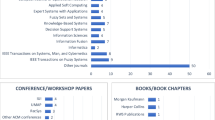Abstract
General approaches for Group Recommendation Systems start from the individual recommendations and merge them in a way to determine the best choice for the whole group. The results presented in the literature showed that traditional aggregation techniques do not seem to capture all the features of real-world scenarios. Furthermore, recent studies in Behavioral Economics evidence the necessity to define utility models that are not compatible with the self-interested utility-maximizing behavior of the traditional economic paradigm. In this work, starting from Other-Regarding Preference models that characterize the utility of an individual considering his/her own behavioral characteristics and the utility of another individual, we aim at obtaining a general model where such characteristics are described in terms of interpersonal relationships, such as, tie strength and conflict. We started by performing an analysis on opinion shifts based on a two sized groups user study, with the aim to empirically determine the extent of the considered parameters on a possible model. The results show that the opinion shifting on the evaluation of an activity to be performed in a group is related to the two considered factors.
Access this chapter
Tax calculation will be finalised at checkout
Purchases are for personal use only
Similar content being viewed by others
References
Alina Christensen, I., Schiaffino, S.: Social influence in group recommender systems. Online Inf. Rev. 38(4), 524–542 (2014)
Arnaboldi, V., Guazzini, A., Passarella, A.: Egocentric online social networks: analysis of key features and prediction of tie strength in Facebook. Comput. Commun. 36(10), 1130–1144 (2013)
Barile, F., Masthoff, J., Rossi, S.: The adaptation of an individual’s satisfaction to group context: the role of ties strength and conflicts. In: Proceedings of the 25th Conference on User Modeling, Adaptation and Personalization, UMAP 2017, pp. 357–358. ACM (2017)
Blanco, M., Engelmann, D., Normann, H.T.: A within-subject analysis of other-regarding preferences. Games Econ. Behav. 72(2), 321–338 (2011)
Bolton, G.E., Ockenfels, A.: Erc: a theory of equity, reciprocity, and competition. Am. Econ. Rev. 90, 166–193 (2000)
Cox, J.C., Friedman, D., Gjerstad, S.: A tractable model of reciprocity and fairness. Games Econ. Behav. 59(1), 17–45 (2007)
Dufwenberg, M., Heidhues, P., Kirchsteiger, G., Riedel, F., Sobel, J.: Other-regarding preferences in general equilibrium. Rev. Econ. Stud. 78(2), 613–639 (2011)
Dunbar, R.I., Spoors, M.: Social networks, support cliques, and kinship. Hum. Nat. 6(3), 273–290 (1995)
Elfenbein, H.A.: The many faces of emotional contagion: an affective process theory of affective linkage. Organ. Psychol. Rev. 4(4), 326–362 (2014)
Fehr, E., Schmidt, K.M.: A theory of fairness, competition, and cooperation. Q. J. Econ. 114(3), 817–868 (1999)
Fehr, E., Schmidt, K.M.: Chapter 8 the economics of fairness, reciprocity and altruism - experimental evidence and new theories. In: Kolm, S.C., Ythier, J.M. (eds.) Foundations, Handbook of the Economics of Giving, Altruism and Reciprocity, vol. 1, pp. 615–691. Elsevier (2006)
Gilbert, E., Karahalios, K.: Predicting tie strength with social media. In: Proceedings of the SIGCHI Conference on Human Factors in Computing Systems, pp. 211–220. ACM (2009)
Granovetter, M.S.: The strength of weak ties. Am. J. Sociol. 78(6), 1360–1380 (1973)
Guo, J., Zhu, Y., Li, A., Wang, Q., Han, W.: A social influence approach for group user modeling in group recommendation systems. IEEE Intell. Syst. 31(5), 40–48 (2017)
Mäs, M., Flache, A.: Differentiation without distancing. Explaining bi-polarization of opinions without negative influence. PloS One 8(11), e74516 (2013)
Masthoff, J., Gatt, A.: In pursuit of satisfaction and the prevention of embarrassment: affective state in group recommender systems. User Model. User-Adapt. Interact. 16(3–4), 281–319 (2006)
Rossi, S., Barile, F., Caso, A., Rossi, A.: Pre-trip ratings and social networks user behaviors for recommendations in touristic web portals. In: Monfort, V., Krempels, K.-H., Majchrzak, T.A., Turk, Ž. (eds.) WEBIST 2015. LNBIP, vol. 246, pp. 297–317. Springer, Cham (2016). https://doi.org/10.1007/978-3-319-30996-5_15
Rossi, S., Caso, A., Barile, F.: Combining users and items rankings for group decision support. In: Bajo, J., et al. (eds.) Trends in Practical Applications of Agents, Multi-Agent Systems and Sustainability. AISC, vol. 372, pp. 151–158. Springer, Cham (2015). https://doi.org/10.1007/978-3-319-19629-9_17
Rossi, S., Cervone, F.: Social utilities and personality traits for group recommendation: a pilot user study. In: Proceedings of the 8th International Conference on Agents and Artificial Intelligence, pp. 38–46 (2016)
Salehi-Abari, A., Boutilier, C.: Empathetic social choice on social networks. In: 13th International Conference on Autonomous Agents and Multiagent Systems, pp. 693–700 (2014)
Senot, C., Kostadinov, D., Bouzid, M., Picault, J., Aghasaryan, A., Bernier, C.: Analysis of strategies for building group profiles. In: De Bra, P., Kobsa, A., Chin, D. (eds.) UMAP 2010. LNCS, vol. 6075, pp. 40–51. Springer, Heidelberg (2010). https://doi.org/10.1007/978-3-642-13470-8_6
Sobel, J.: Interdependent preferences and reciprocity. J. Econ. Lit. 43(2), 392–436 (2005)
Takács, K., Flache, A., Mäs, M.: Discrepancy and disliking do not induce negative opinion shifts. PLOS One 11(6), e0157948 (2016). https://doi.org/10.1371/journal.pone.0157948
Author information
Authors and Affiliations
Corresponding author
Editor information
Editors and Affiliations
Rights and permissions
Copyright information
© 2018 Springer Nature Switzerland AG
About this paper
Cite this paper
Barile, F., Masthoff, J., Rossi, S. (2018). Modeling the Changing of the Individual Satisfaction in a Group Context: A Study on Two Sized Groups. In: Ghidini, C., Magnini, B., Passerini, A., Traverso, P. (eds) AI*IA 2018 – Advances in Artificial Intelligence. AI*IA 2018. Lecture Notes in Computer Science(), vol 11298. Springer, Cham. https://doi.org/10.1007/978-3-030-03840-3_36
Download citation
DOI: https://doi.org/10.1007/978-3-030-03840-3_36
Published:
Publisher Name: Springer, Cham
Print ISBN: 978-3-030-03839-7
Online ISBN: 978-3-030-03840-3
eBook Packages: Computer ScienceComputer Science (R0)




